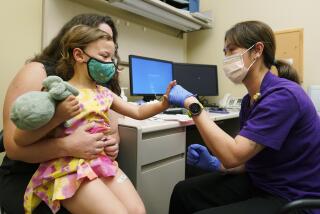A hot-button issue
A colleague of mine was on call several years ago when he was paged to the emergency room to evaluate a baby with a fever. He started by asking the child’s mother how high the temperature was.
375 degrees, she answered.
My colleague looked at her for a moment. How, he asked, had she figured?
She didn’t have a thermometer. So to check, she turned on her oven and put one hand on her baby and one hand in the oven. When the temperature felt about the same on both of her hands, she wrote it down.
Most of us would probably just go out and buy a thermometer. But it’s hard to deny that fevers are confusing and thus anxiety-provoking. They’re the biggest reason parents call their child’s pediatrician or rush to an ER in the middle of the night. In my first year of practice, I spent many nights returning calls to parents about fevers. It amounted to a whole lot of sleep deprivation -- for me and for those bleary-eyed parents.
About two decades ago, pediatrician Barton Schmitt of the University of Colorado School of Medicine, Denver decided to ask parents about fevers and discovered many misconceptions. He polled 81 parents and found that 94% believed that fever could cause serious harm, including permanent brain damage. A significant percentage believed that left unchecked, a child’s temperature could rise to 110 degrees or higher. More than half of the parents treated their children for a temperature that was normal (under 100.4 degrees) with either fever reducers (known as antipyretics) or sponge baths of ice cold water or alcohol. And many, like those parents I dealt with early in my career, needlessly woke their child up to take their temperature or give them medicine.
Schmitt coined the phrase “fever phobia” for this jumble of worry and mismanagement.
Although it is parents who suffer from fever phobia, we pediatricians have in large part been responsible for perpetuating it. Many of us are fever phobic ourselves. In a study of about 230 pediatricians published in 1992 in the journal Pediatrics, two-thirds responded that an elevated body temperature in itself could be dangerous to a child. Like parents, they believed that brain damage and death were fever’s worst outcomes.
And what about treating fevers? We doctors again showed our ignorance in a study published by the American Academy of Pediatrics in 2000. Its authors wanted to know why pediatricians were telling parents to alternate Tylenol and Motrin to control fevers. About a third cited guidelines on fever management from the academy. A quarter said they learned it from mentors.
But the academy guidelines say nothing about alternating antipyretics, and at the time of the study there was no evidence that this was effective and safe. (Studies have since suggested the practice may be effective, but the risk of mis-dosing or overdosing a child doesn’t warrant it.)
Here are some medical realities about fever: First, it’s natural. A rise in the body’s temperature can help slow bacterial and viral reproduction and signals the immune system to rev up for a fight. Although a few kids between the ages of 6 months to 6 years can have a brief seizure from fevers (an event not related to the fever’s height but perhaps to how fast it rises), it’s next to impossible for a child to sustain permanent damage as a result of even high fevers (officially defined as over 105.8 degrees, although that’s also subject to a great deal of variation among doctors).
When treating fever, look at your child instead of the number on the thermometer -- many kids feel well with even moderately high fevers. The same can’t be said for some fever remedies. Ice water baths induce shivering, which makes kids less comfortable, and alcohol baths increase the risk of dehydration and hypoglycemia.
Many doctors cite time as the biggest barrier to better fever education. Also, most parents feel powerless when their child is sick, and doctors don’t want to make them feel even more so by telling them to do nothing.
Studies show that education can cure fever phobia. A 1989 study published in the American Journal of Diseases in Childhood compared fever phobia in 250 parents who were given an educational pamphlet with 250 given the same pamphlet who also watched a 10-minute video on fevers. Those who watched the video reported increased understanding and more confidence in managing fever. Over eight months, there was a 35% decrease in doctor’s office visits for fever.
All this goes to show that what we doctors lack when it comes to fever management isn’t a detailed knowledge of physiology and drugs. It’s patience, persistence and the determination to prescribe education instead of medicine as therapy.
--
Dr. Rahul K. Parikh is a board-certified pediatrician at Kaiser Permanente’s Walnut Creek Medical Center.






